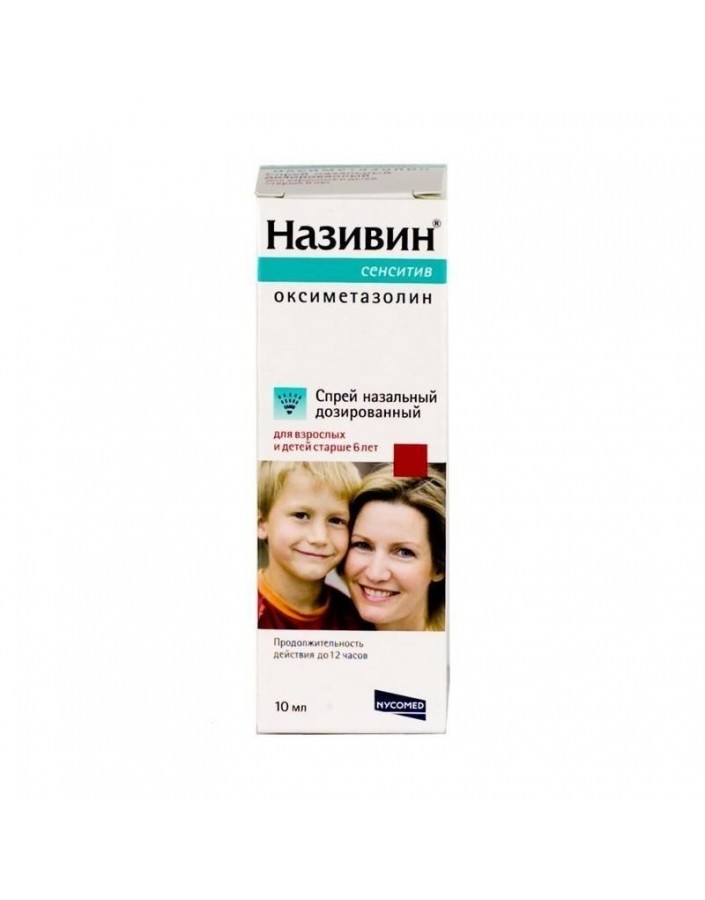




Security policy (edit with Customer reassurance module)

Delivery policy (edit with Customer reassurance module)

Return policy (edit with Customer reassurance module)
Composition
Nazivin Sensitive 11.25 mcg / dose contains: Oxymetazoline hydrochloride - 0.25 mg
Nazivin Sensitive 22.5 mcg / dose contains: Oxymetazoline hydrochloride - 0.5 mg
Farmgroup:anti-congestive agent - a vasoconstrictor (alpha adrenomimetic).
Pharmaceutical action:Nazivin Sensitive has a vasoconstrictor effect.
When applied locally to the inflamed mucous membrane of the nasal cavity, it reduces its swelling and nasal discharge. Restores nasal breathing. Elimination of edema of the mucous membrane of the nasal cavity helps to restore aeration of the paranasal sinuses of the nasal cavity, middle ear cavity, which reduces the likelihood of bacterial complications (sinusitis, sinusitis, otitis media).
With local intranasal use in therapeutic concentrations does not irritate and does not cause hyperemia of the mucous membrane of the nasal cavity.
Oxymetazoline begins to act quickly, within a few minutes.
The duration of action Nazivin Sensitive up to 12 hours.
Pharmacokinetics:With local intranasal use, Oxymetazoline does not have a systemic effect. The half-life of Oxymetazoline with its intranasal administration is 35 hours.
2.1% Oxymetazoline is excreted in the urine, about 1.1% in the feces.
Indications:- colds or viral infections of the upper respiratory tract, accompanied by a runny nose, sinusitis, eustachitis, otitis media, rhinitis of any etiology
- to eliminate edema before diagnostic manipulations in the nasal passages
Category of action on the fetus:When used during pregnancy or breastfeeding, the recommended dose should not be exceeded.
The drug can be used only in those cases where the potential benefit to the mother outweighs the potential risk to the fetus and child.
Contraindications:Atrophic rhinitis, angle-closure glaucoma, hypersensitivity to the drug.
- For Nazivin Sensitive nasal spray dose of 11.25 mcg / dose - children up to 1 year.
- For Nazivin Sensitive spray nasal dosage of 22.5 mcg / dose - children's age up to 6 years.
Carefully. With elevated intraocular pressure, chronic heart failure, arterial hypertension, angina pectoris, arrhythmia, chronic renal failure, in patients with prostatic hyperplasia with clinical symptoms (urinary retention), marked atherosclerosis, hyperthyroidism, diabetes mellitus, pheochromocytoma.
Dosing:Nazivin Sensitive nasal spray is intended for intranasal administration.
- For children aged 1 to 6 years: 1 injection Nazivin Sensitive nasal spray dose of 11.25 mcg / dose in each nostril 2-3 times / day. The drug is used for 5-7 days.The drug can be prescribed again only after a few days.
- Adults and children over 6 years old: 1 injection Nazivin Sensitive spray nasal dosage 22.5 mcg / dose in each nostril 2-3 times / day.
If the symptoms worsen or the improvement does not occur within 3 days, you should consult with your doctor. In the recommended dose without consultation with the doctor to use no more than 7 days.
A single injection of 45 μl contains:
- 11.25 mcg Oxymetazoline hydrochloride - for Nazivin Sensitive nasal spray dose of 11.25 mcg / dose.
- 22.5 mcg Oxymetazoline hydrochloride - for Nazivin Sensitive nasal spray dosage of 22.5 mcg / dose.
Side effect:Sometimes: dryness or burning sensation of the mucous membrane of the nasal cavity, sneezing.
In rare cases: after the effect of the use of Nazivin Sensitive passes, a strong feeling of nasal congestion (reactive hyperemia).
Rarely: high blood pressure, headache, dizziness, feeling of heartbeat, tachycardia, anxiety, irritability, sleep disorders (in children), nausea, insomnia, exanthema, blurred vision (if it gets into eyes).
Prolonged continuous use of vasoconstrictor drugs can lead to tachyphylaxis, atrophy of the nasal mucosa and recurrent edema of the nasal mucosa (rhinitis medication).
Overdose:Symptoms: nausea, increased blood pressure, tachycardia, central nervous system oppressor.
Treatment: symptomatic.
Interaction:Slows down the absorption of local anesthetic drugs, prolongs their action.
In patients taking monoamine oxidase inhibitors (MAO) during the preceding 2 weeks and within 2 weeks after their withdrawal, tricyclic antidepressants or other drugs that help increase blood pressure - increase blood pressure.
The joint appointment of other vasoconstrictor drugs increases the risk of side effects.
Special instructions:Avoid contact with eyes.
Impact on the ability to drive vehicles and equipment:
After prolonged use of remedies for rhinitis containing Oxymetazoline, in doses exceeding the recommended, it is impossible to exclude the overall effect on the cardiovascular and central nervous system. In these cases, care should be taken when driving and engaging in other potentially hazardous activities that require increased concentration and psychomotor reactions.